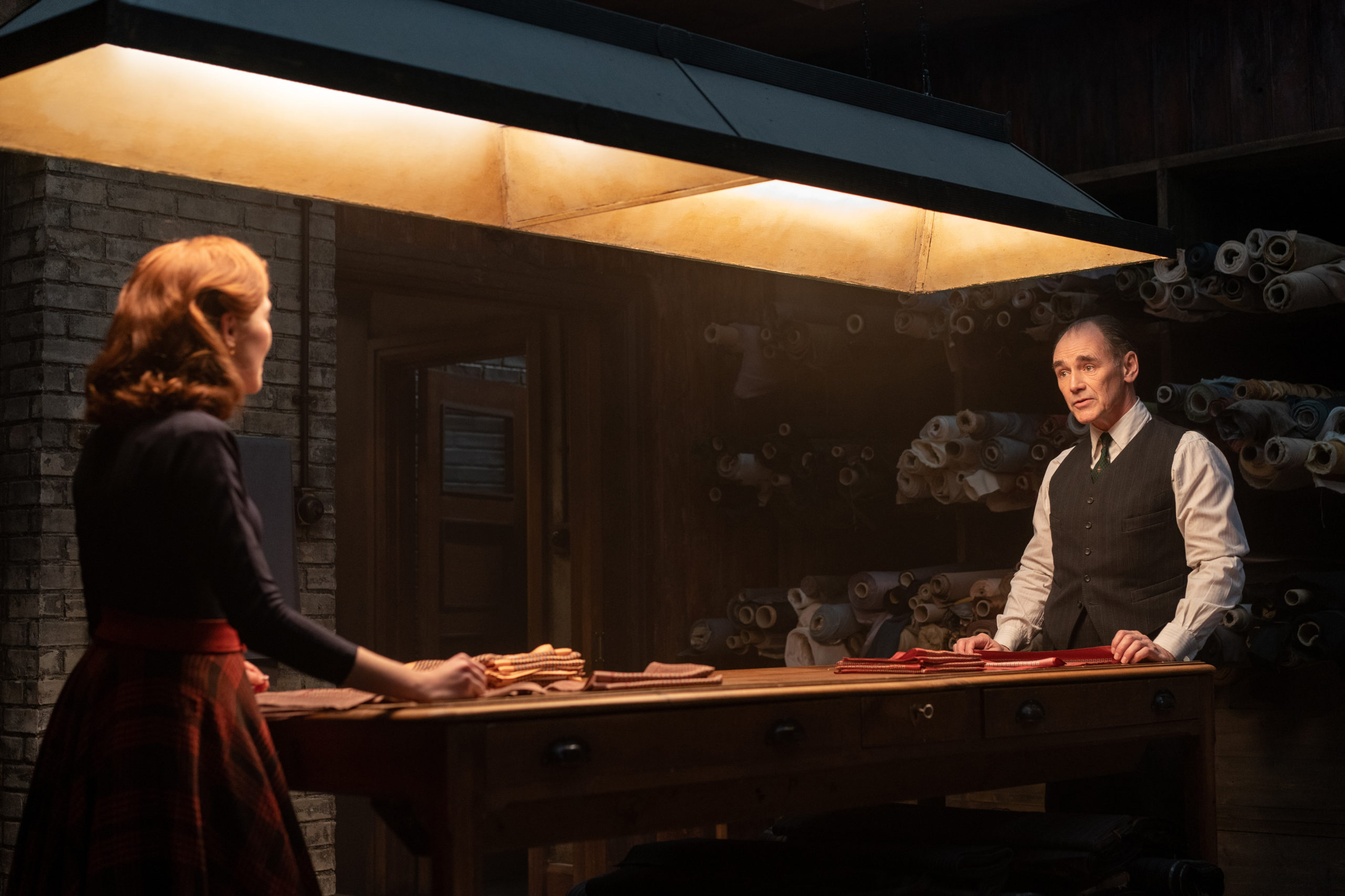If you should refer to him as a tailor he will correct you—he’s a “cutter,” you see, and one of Chicago’s finest in the bespoke men’s attire business, quietly fitting and snipping and hemming suits as objets-d-art from within his fastidious south side atelier.
His name is Leonard Burling, played by a great Mark Rylance, and his defining talent—other than providing meticulous alterations—is recessive observation, the ability to see all, hear all and remain reticent, particularly when it comes to the underworld denizens frequenting his tiny shop. That shop and its tight quarters are the sole location for the minimalist The Outfit, a tensely coiled, 1956-set mob saga tiny in scale yet filled with big surprises.
Directed by Graham Moore (an Oscar winner for his The Imitation Game screenplay) and co-written by Moore and Johnathan McClain, The Outfit is not exactly a mafia picture in the traditional sense—there is no sprawl—as it all takes place in a confined location and is told in far lower key than say, Scorsese, Coppola or Leone. But it nonetheless contains the genre staples of shifting loyalties, double-crosses, sudden and ferocious violence and surprising, hidden identities. That all of this takes place in a claustrophobic clothing shop lends the picture both staginess and cleverness, a lean and mean example of storytelling in virtual real time; one could easily imagine the picture as an equally effective theatrical one-act.
Trained on London’s famed Savile Row (where Rylance interned to convincingly learn the trade), Leonard is most often referred to as “English” by the two-bit Chicago gangsters who frequent his shop as a clandestine gathering place and use its mysterious, backroom dropbox as a method of communicating. He sees nothing and hears nothing, but is aware of all, and keeps a near-paternal relationship with a young assistant, Mable (played with appealing moxie by Zoey Deutch), who dreams of leaving the Windy City behind for far more exotic locales.
The local mobsters include young Richie (a terrific Dylan O’Brien) and best friend and partner Francis (Johnny Flynn), and in the picture’s set-up they chide Leonard for his taciturn reservation. Richie is also secretly dating Mabel, a development from which nothing good will come. After Richie takes a bullet to his abdomen, Leonard, with needle and thread, is called upon to sew him up. And this development, the product of a rival mob dispute, thrusts the picture’s enjoyable maneuvers into high gear.
At the halfway point comes a terrific supporting performance, the sort of friendly menace so familiar to movie mafia tough guys who radiate civility and intimidation in equal measures and can alternate on a dime. That performance is by Royal Shakespeare Theatre veteran Sir Simon Russell Beale as Irish mafioso Roy Boyle, Richie’s father, who smells a rat when his son suddenly goes missing (and indeed there is a mysterious traitor in their midst). With forceful, contemplative glares and dramatic pauses, he exerts a glowering authority in direct contrast to Rylance’s understatement.
And in the picture’s surprising climax, Boyle’s rival mob leader makes an appearance as one Violet La Fontaine, played with stylish sophistication by Nikki Amuka-Bird as a cool French customer in search of a mysterious and incriminating tape.
Moore’s narrative challenge, largely met, was crafting a maximalist plot in a decidedly minimalist set and much of the picture’s fun comes in its impressive physical chess game of how many characters populate the confined space. As they come and go, a body is hidden and stakes get raised, all within two rooms, and Moore makes superb use of his handsome set’s shades, doors, tables, drawers and windows.
The modest scale allows the actors to deliver the picture’s showmanship, and Moore’s overall approach of low-key, sly calibration, largely built on his dialogue, is refreshing in a film for adults eschewing the usual outsized action and hijinks that drive most modern crime thrillers.
Instead, The Outfit presents a pitch-perfect slow-burn of revelations, backtracks and surprises, beginning with Rylance, the famed Oscar-winner for Bridge of Spies and who had a rare off day recently as a flamboyant tech guru in Adam McKay’s flat-footed Don’t Look Up, proving that even the world’s great actors, at times, need a director.
Here the actor inspires fascination, drawing us to him for final reel expository revelations that force a re-evaluation of what we think we’ve known about the reticent gentleman, a model of subtlety until he isn’t, defined by his vocation until his past suddenly snaps into focus.
The Outfit is a crafty, satisfying gem.
3 1/2 stars.



